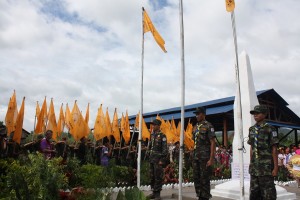Continued Conflict Overshadows Karen Martyrs Day
By Burma Partnership • August 20, 2012 While Karen people around the world celebrated the 62nd Karen Martyrs Day last week to honour those who have died for the Karen cause, the fragility of the ceasefires with various groups remains tenuous as the Burma government continues to neglect the root causes of the conflicts. Denial and refusal to face up to human rights abuses while neglecting substantial political dialogue with the ethnic armed groups is not a sustainable solution to decades of conflict.
While Karen people around the world celebrated the 62nd Karen Martyrs Day last week to honour those who have died for the Karen cause, the fragility of the ceasefires with various groups remains tenuous as the Burma government continues to neglect the root causes of the conflicts. Denial and refusal to face up to human rights abuses while neglecting substantial political dialogue with the ethnic armed groups is not a sustainable solution to decades of conflict.
Even during peace talks between the Government and the Karen National Union (KNU) in Myawaddy, eastern Karen State on August 7th, clashes between the government’s Border Guard Force and the Karen National Liberation Army (KNU’s armed wing) were occurring in other parts of the Karen region.
Present at the peace talks, as has often been the case, were business people acting as mediators. The focus on development activities by the Burma Government and some elements of the international community in place of establishing a political settlement is putting the peace process at risk. This was articulated at the Martyrs Day celebrations as a Klohtoobaw Karen Organization representative (political wing of the Democratic Benevolent Buddhist Army) read out a statement written by KNU President, Saw Tamla Baw; “The government is engaged only in superficial and apparent activities of peace building with emphasis only on business matters, and without any political essence.”
The ceasefires signed between the Burma Army and ethnic armed groups, especially the KNU, are held up as examples by those in the international community who want to believe that the Thein Sein administration is truly reformist. The continued fighting and lack of political dialogue, however, reveals the flaws in this supposed peace process.
Meanwhile, human rights abuses in ethnic areas continue such as the theft of Church donations and the rape of a 14-year old Shan girl by Burma Army soldiers. The perpetrators, however, are not held accountable.
As the conflict in Kachin State continues, and more and more troops move into the region, the government-aligned, Myanmar National Human Rights Commission (MNHRC) released a statement last week in which allegations of forced recruitment by the Kachin Independence Army (KIA) were made, ignoring documented evidence that this is also a typical Burma Army policy, while dodging allegations of torture inflicted by the Burma Army for “security reasons.”
Similarly, in response to the UN Special Rapporteur, Tomas Ojea Quintana’s call for an independent truth commission to investigate accusations of state-sponsored violence in Arakan State, Win Mra, chairman of the MNHRC said that such a body would only “instigate problems.” Not only does this expose the impotence and bias of the MNHRC but it reveals how unwilling the government is to address fundamental concerns and grievances of ethnic people while their soldiers remain above the law. Rather, the government has set up a 27-person commission to find out “the real cause of the incident” yet not one Rohingya is on this said commission.
The resentment towards the Rohingya community is being used by the government as a tool to foster criticism of the Special Rapporteur. As such, the call this week by 24 political parties to replace the Special Rapporteur seems misplaced when human rights abuses are continuing and are being denied, covered up or the blame shifted unfairly. Accountability is still conspicuously absent, and ethnic conflict and militarization in ethnic areas is increasing. It is because of these issues, both in Arakan State and other ethnic areas that the Special Rapporteur is needed, and it is because of these issues that a truth commission should be supported. The reluctance of the government to engage in political dialogue or to hold perpetrators of human rights abuses accountable, does not bode well for sustainable peace in Burma.
Tags: Armed Conflict, Ceasefire, Human Rights, Karen National UnionThis post is in: Blog
Related PostsBurma Army Displays Blatant Disregard for 21st Century Panglong Peace Process
On Union Day, Reappraisal of the Peace Process is Needed
ရွမ္းျပည္တိုိးတက္ေရးပါတီ၊ ရွမ္းျပည္တပ္မေတာ္ SSPP/SSA ထုတ္ျပန္ေၾကညာခ်က္
Time for the Government to Accept the Reality of Human Rights Problems, Take Effective Measures and Move Forward
Kachin Region: War Torn Displaced Village Profiles









 All posts
All posts